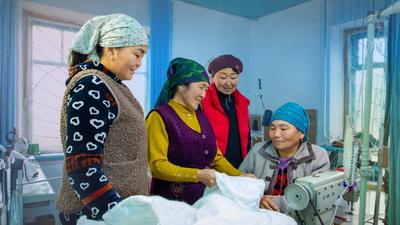-
Our work
-
Fields of work
- Arms control
- Border management
- Combating trafficking in human beings
- Conflict prevention and resolution
- Countering terrorism
- Cyber/ICT Security
- Democratization
- Economic activities
- Education
- Elections
- Environmental activities
- Gender equality
- Good governance
- Human rights
- Media freedom and development
- Migration
- National minority issues
- Policing
- Reform and co-operation in the security sector
- Roma and Sinti
- Rule of law
- Tolerance and non-discrimination
- Youth
- Field operations
- Projects
-
Meetings and conferences
- Summit meetings
- Review Conferences
- Ministerial Council meetings
- Plenary meetings of the Permanent Council
- Plenary Meetings of the Forum for Security Co-operation
- Security Review Conferences
- Annual Implementation Assessment Meetings
- Economic and Environmental Forum
- Economic and Environmental Dimension Implementation Meetings
- Human rights meetings
- Media conferences
- Cyber/ICT security conferences
- Conference of the Alliance against Trafficking in Persons
- Gender equality conferences
- Annual OSCE Mediterranean conferences
- Annual OSCE Asian conferences
- Partnerships
-
Fields of work
-
Countries
- All
-
Participating States
- Albania
- Andorra
- Armenia
- Austria
- Azerbaijan
- Belgium
- Belarus
- Bosnia and Herzegovina
- Bulgaria
- Canada
- Croatia
- Cyprus
- Czechia
- Denmark
- Estonia
- Finland
- France
- Georgia
- Germany
- Greece
- Holy See
- Hungary
- Iceland
- Ireland
- Italy
- Kazakhstan
- Kyrgyzstan
- Latvia
- Liechtenstein
- Lithuania
- Luxembourg
- Malta
- Moldova
- Monaco
- Mongolia
- Montenegro
- The Netherlands
- North Macedonia
- Norway
- Poland
- Portugal
- Romania
- Russian Federation
- San Marino
- Serbia
- Slovakia
- Slovenia
- Spain
- Sweden
- Switzerland – OSCE Chairpersonship 2026
- Tajikistan
- Türkiye
- Turkmenistan
- Ukraine
- United Kingdom
- United States of America
- Uzbekistan
- Asian Partners for Co-operation
- Mediterranean Partners for Co-operation
-
Structures and institutions
- Chairpersonship
-
Secretariat
- Secretary General
- Office of the Secretary General
- Conflict Prevention Centre
- Transnational Threats Department
- Office of the Special Representative and Co-ordinator for Combating Trafficking in Human Beings
- Office of the Co-ordinator of OSCE Economic and Environmental Activities
- Gender Issues Programme
- Opportunities for Youth
- Department of Human Resources
- Department of Management and Finance
- Office of Internal Oversight
- Documentation Centre in Prague
- Institutions
-
Field operations
- Presence in Albania
- Centre in Ashgabat
- Programme Office in Astana
- Programme Office in Bishkek
- Mission to Bosnia and Herzegovina
- Programme Office in Dushanbe
- Mission in Kosovo
- Mission to Moldova
- Mission to Montenegro
- Mission to Serbia
- Mission to Skopje
- Project Co-ordinator in Uzbekistan
- Closed field activities
- Parliamentary Assembly
- Court of Conciliation and Arbitration
- Organizational structure
- About us
Story
Strengthening peace and stability through greater co-operation in the transport sector
- Date:
- Source:
- OSCE Secretariat
- Fields of work:
- Economic activities, Environmental activities
During the Balkan wars of the 1990s, a number of important trade routes on both land and water - including the vital River Danube - were restricted or even blocked altogether by sanctions or military action.
The economic consequences for the countries of the region were extremely severe.
"It is easy to understand that conflicts can have a negative influence on a country's trade and transit potential," says Bernard Snoy, Co-ordinator of OSCE Economic and Environmental Activities.
"But it is equally important to realize that there does not necessarily have to be an open conflict for transport-related factors to harm the economic potential of a country or region.
"Issues such as the high cost of imports and exports, a lack of transparency and good governance of border and customs agencies and procedures can render some economic activities almost unviable," he adds.
Risk of losing competitiveness
In such cases, countries risk losing their competitiveness vis-à-vis other states, which can prevent them from improving living standards and thus raise social tensions.
The theme of this year's OSCE Economic Forum - Transportation in the OSCE area: secure transportation networks and transport development to enhance regional economic co-operation and stability - offers a novel approach to the problem.
The Forum, the theme of which was proposed by the Belgian OSCE Chairmanship, not only considers transport highly relevant for the promotion of regional trade and sustainable economic development, but stresses its contribution towards the search for peaceful settlements to unresolved conflicts in the OSCE region.
Costs of unresolved conflicts
This is of particular significance since, as was pointed out in a recent presentation by Ambassador Roy Reeve, Head of the OSCE Mission to Georgia, the economic opportunity costs of unresolved conflicts are often underestimated.
Ambassador Reeve was addressing a meeting of the Permanent Council's Economic and Environmental Sub-committee on the subject of an OSCE-led needs assessment study on transport and infrastructure in the zone of the Georgian-Ossetian conflict.
The study was conducted over a three-month period by international and local experts in the fields of road engineering, energy, civil engineering, business development, rural development and banking and finance.
Efforts were made to involve local experts from both sides of the conflict, which contributed to the strengthening of local ownership and served as a confidence and capacity-building measure, explained Ambassador Reeve.
He noted that the study used economic rehabilitation as a means of building confidence and creating a constructive political dialogue, especially in the field of transport.
Ambassador Reeve also expressed the hope that future projects in the region would try to maximize their impact by involving all communities.
Exploring the issues
These issues and numerous others related to the development of the transport sector in the OSCE region will be further explored in the second part of the 14th OSCE Economic Forum, which takes place in Prague on 22-24 May 2006.
Part one of the Forum was held in Vienna on 23 and 24 January this year.
OSCE Impact
Discover more stories about how the OSCE improves lives.

